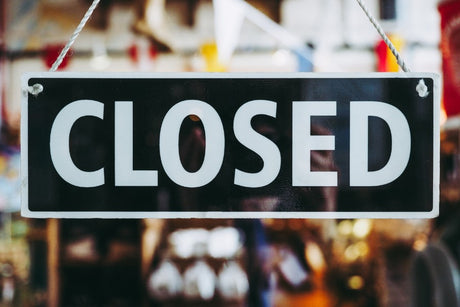Burning gas and burning out.
It's been a big year, so we have many topics to cover.
Without a doubt, 2018 has been our most challenging year since 2007 and not for reasons that first spring to mind.
We de-commissioned and sold two roasting systems, then installed a relatively large and complex plant using the world's most advanced and intelligent roasting solution.
These initiatives were the graceful swan's fast peddling legs underwater and out of sight.
We completed the programs while maintaining the rapid speed in roasting, packing and sending out customers' orders with astonishing efficiency.
It smells like a whiff of success, but I'm unsure.
It was tough, way too tough, to be brutally honest.
These days, our operational velocity is quite difficult to sustain every day - it's not just a simple case of roasting more kilos, but the high labour efforts involved to ensure the diversity of our large portfolio of freshly roasted and the flexible options we offer our customers - we are selling 400+ enumerations of coffee every day when you consider pack sizes and grind types - all processed with speed and precision.
Are we hitting walls? - probably. Do we have to think differently in the future? - absolutely. Have we got the answers and plan? - it still needs to be. Will we keep pushing the limits for our customers? - you bet!
Fake news, smoke & mirrors
As a keen observer of all things around me, I can't help but wonder about the doom and gloom peddled by toxic media and politicians who are deeply out of touch with the wants and needs of their voters.
Surely, it's at odds with reality, and the recent Victorian State elections proved a compelling case of most pundits getting it completely wrong and being surprised.
Sensationalism sells as they say - housing values crashing, bank and big business profits declining, retailers going bust, congested transport infrastructure (a rare truth), wages stagnant for almost a decade - if you believe the media, it appears our golden days are well and truly now behind us.
Yet, why is our economy booming and enjoying its longest growth in history?
More to the point, why have some of the smartest folks in Australia - those boffins working in think tanks - proven that the market powers of large companies are at their peak and dangerously increasing - to the detriment of consumers and market competition?
Unemployment is healthy, immigration continues unchecked at a record pace, and even though I'm on the road early each morning, the traffic remains packed with Tradies rushing to their work site before the sun rises.
Just five years ago, the roads at 6 a.m. were far less congested, and these days, I'm the only person on the street not driving a ute or van.
No wonder the Toyota Hilux was Australia's biggest-selling car in 2017.
Drive almost anywhere in Melbourne, and you are bound to hit roadworks - probably more than once - it's been that way for years, and reliable bell weather of economic progress at a frantic pace.
Travel down suburban Melbourne streets, and at least one or many sites with building works underway are knocked down for a dual-occ or triple-pack.
Councils love this density as it generates higher rate revenues.
In my neighbourhood, each Saturday morning, the peace is disturbed by the sounds of a house nearby being demolished - why they do this on a Saturday morning is anyone's guess, oh, yes, of course. WorkSafe inspectors don't work Saturdays!
I haven't been up to Sydney in a while, but I'm guessing it's likely to be somewhat similar - land is precious and anxiety over its future value holds our minds to ransom.
What these signs of activity signal is that capital and funds are easily available and, more to the point, being deployed.
Approximately 10% of adults in Victoria find employment in the construction or infrastructure industry.
Retail is shifting faster than anyone realizes - especially flat-footed retailers.
Walk through retail precincts, and it's an entirely contrasting image of empty stores, tacky "SALE" signs and sluggish trade - sales assistants with long faces.
Some of Melbourne's once worshipped shopping strips like Bridge Road and Chapel Street are experiencing vacancy rates of 20% to 30%.
Most of the smart operators have already moved out, landlords want high rents and, hence, a major disconnect with realities.
In last month's article, we outlined challenges in hospitality, and these pressures continue to build each day, with many cafe owners desperately wanting to pass through that exit door.
Rising costs versus price deflation - the grind of always being squeezed hurts. For the first time in almost 15 years, we see cafes closing - not just changing hands.
Coles and Woolworths, along with many large retailers, are adjusting their strategies to shift away from chasing sales volume through fierce discounting.
Instead, they are re-positioning to extract higher margins from smaller stores tailored to the local demographic.
If I wasn't mistaken, this gives up a sign Coles and Woolworths have conceded price war defeat to Aldi - a brand that is now Australia's most trusted - a feat that reads like a fairytale.
Retailers are streamlining and rationalizing their product range, focusing more on their private labels where they generate higher margins and innovating through value-added solutions such as prepared meals.
It seems supermarket shopping has transformed in the last ten years from a single, large pantry-filling trip in a shopping centre on a Saturday into daily trips to local foodie outlets to pick up something for "tonight".
Fuelling this growth are the food delivery portals, scraping the profits and margins from food outlets and posing, "What will you be eating tonight ?".
The entire grocery mindset has changed from the traditional bulk weekly spend into one of convenience and choice - with retailers moving fast to play catch-up by matching this transition with smaller, targeted offerings and home delivery from nimble, strategically located "dark stores".
However, in moving away from the pursuit of volume, these approaches risk short-term backlash from investors, analysts and shareholders accustomed to basing their valuations or measures of a company's performance predominantly upon like-for-like store sales growth.
The first sniff of a potential top-line sales decline sparks share price routs.
Myer is a classic example of a business in serious trouble, having spent too long juggling sales figures and attempting to hold a line through margin-destroying discounting.
In the process, they completely abandoned their customer base and lost the basic art and spirit of retailing.
With Myer's declining sales of 4.8% and a somewhat weak 3.6% online growth, it will be a tough road ahead for the retail icon.
I'm not sure their "back to basics" strategy applies to the changed ways in which consumers spend.
It's an outmoded and desperately vague concept to hope buyers return without doing something radically different other than rationalization.
Knowledge (a.k.a. power) shifts - the consumer is better informed than the retailer.
Some say it's the digital disruption cannibalizing retail - dramatically increasing the possible number of alternatives and spreading the market segments wide open by offering the consumer unlimited choice.
It's precisely how Amazon conquered the US by recruiting thousands of sellers, all competing for the buyer's attention by discounting deeper and deeper.
There is more than a degree of truth in that sentiment, and I only have to look at my habits to know what's happening.
These days, I can only make decisions after researching on my iPad, phone or computer.
This research consumes the hours each night before bed instead of watching TV.
It doesn't matter if it's a special bolt, a jib crane or a set of tyres. I prefer researching to viewing the nonsense on TV as broadcast networks lose the plot with boring, re-hashed, tacky reality productions.
More importantly, I'm completely immune to advertising, as my shopping regime has a laser-like focus.
A few weeks ago, I needed nitrate single-sided adhesive tape, and Bunnings is just 1.5km from our warehouse.
Still, because I don't particularly appreciate battling traffic late in the afternoon and wasting more than an hour, I ordered it online from an interstate specialist tape provider.
Their offering was far more expensive, but importantly, it was tailored and frictionless - so they won my $$.
Bunnings' deliberate strategy to avoid comprehensive e-commerce (for them, it makes sense at the moment with a monopoly and the up-sell opportunity from in-store visits) lost my customers at that time.
The Bunnings website could have been more helpful. In their defence, they have 100's thousands of products, but the point is they were not interested in helping the customer be time efficient - instead forcing the customer to come to them and self-serve. It's their model and strategy.
Somehow, along the way of becoming too busy to partake in shopping, I subsequently lost the knack of picking up a phone and speaking to a person or jumping in the car and visiting a seller.
When you are time-poor, "shopping" moves from daytime to night, and product delivery becomes an essential criterion.
Another unreported economic segment on the rise is online shopping addicts - those people who can't resist looking at deals or new stuff - an electronic marketer's dream.
Twenty years ago, they might have loved watching the ads on TV, listening to the radio, and secretly binging on late-night shopping channels, even if the sales pitch involved wasting a cringe-worthy 12 minutes of your life putting up with a long, drawn-out infomercial.
Yes, we all know one, that person who derives immense pleasure flicking through new glossy department store catalogues for inspiration to spend.
Real shopping addicts crave constant retail therapy, and it's unlikely they will give up visiting the shops - loving anything new and exciting regardless of their need - reminds me of my darling wife, Dianne.
She prefers to get dressed up and shop, whereas I like to order online and have it delivered. I'm not lazy, just time-poor.
Online Marketplaces - are merchants working for nothing?
If you believe the so-called experts, Online marketplaces have become the new retail battleground. In Australia, around Y2K, eBay enjoyed a long reign, killing off Trading Post as the default location for buying and selling used or unwanted goods.
Still, as eBay's commercial focus shifted to extracting higher fees for limited value-add, sellers deserted the platform in search of free exchanges like Gumtree (also owned by eBay).
Around 2010, eBay began pivoting from a marketplace that relied upon mostly used goods sold by individuals into a platform that recruited traditional merchants with storefronts needing an extra channel online.
Their pitch was "we have the buyers", whether it was true or imagined.
As the transformation of eBay accelerated, many merchants were becoming frustrated with eBay's treatment of sellers - regularly changing the goalposts, raising fees, making it difficult to configure shipping, enforcing special compliance in listings,
But the biggest problem is eBay changing their search algorithm (Best Match) to bias certain seller strategies, particularly those merchants giving away free shipping or overseas sellers able to bypass Australian freight companies and the sub-standard, expensive shipping service offered to Australian companies.
Not only did merchants abandon the eBay platform, but it appeared that buyers were also shopping on eBay less frequently.
As a seller with 11 years of eBay experience, we could see first-hand the decline in eBay channel activity.
Today, it represents less than 0.3% of our sales, so it's being shut down soon as it's no longer relevant.
Besides, we have never been comfortable supporting eBay's syphoning profits from Australia to overseas without paying appropriate taxes in our country.
Of course, eBay Australia would argue against such claims, rolling out statistics of higher shopper numbers and sales figures.
Still, there are too many competing marketplaces for eBay to remain relevant moving forward.
Gumtree cannibalized much of what eBay used to offer in the used goods segment, Facebook has its marketplace of unwanted items, Catch Group picks up a large chunk of the distressed inventory sector, Kogan is running fast but hitting more and more speed bumps every day and of course, the elephant in the room - Amazon Australia - who's launch has been surprisingly underwhelming, but starting to gather steam as they dig into their war chest of investments in a massive recruitment driver for buyers with Prime membership.
Smart merchants see the importance of having a direct relationship with their customers. Amazon and eBay build their platforms to own as much of the customer (buyer) spend as they can control.
The rules and policies around customer engagement on their media are strict and, in many cases, have severe or dire penalties for sellers.
Selling on eBay or Amazon is a cold, desolate wasteland of borderline slavery - there's no warmth or affection at a retail level, and often it's only viable at razor margins with a big bunch of risks attached - nobody wins that game long-term as the risks inevitable convert to stark realities.
Imagine this for a moment: a buyer on Amazon purchases a product from a seller, and the seller places a nice thank you gesture in the parcel, thinking they are doing the right thing, Amazon finds out and suspends the seller for attempting to solicit business outside of the Amazon platform.
It's real - believe it.
These actions aim to maintain high seller standards for exceptional customer experience.
Still, it's only a smoke screen justifying their domination strategy to own the buyer.
In the US, online marketplaces account for more than 60% of retail spending, with Amazon commanding almost 45% - with many predicting Amazon will pass 50% in the next six months.
A recent report in the AFR claimed that Amazon AU was selling some grocery products that were cheaper than Coles and Woolworths.
Parcel logistics in Australia - the broken record that keeps on spinning.
Commentators and analysts like to take the lazy position of believing retail in Australia always follows the direction of the US.
There is no doubt that online retail is growing fast at the expense of brick-and-mortar shopping.
Still, the key limitation holding back online retail will always be Australia's dysfunctional and broken parcel logistics industry.
Why? Because AusPost continues to hold a disturbing level of market power in residential freight.
Their merchant agreements sellers must accept toxic examples of legal protection, enabling AusPost to avoid all responsibilities and liabilities.
It means AusPost is not accountable for anything - they can lose your parcel, damage it, even steal it or send it via the wrong state for two weeks longer than it usually takes.
In simple terms, AusPost can charge a fee for a service that is not delivered. They can perform at atrocious levels, yet they cannot be held accountable - with no remedies in their agreements.
Worse still, their poorly trained support centre staff compel receivers experiencing difficulties in contacting the sender to sort out the problems, which, as you can probably understand, is utterly ridiculous when AusPost owns the parcel - it's these sorts of abject failures to take responsibility that manifest into a culture of Teflon and deflection.
Merchants (sellers) in Australia take all the risk in online delivery, yet we need help to help ourselves or our customers when things go wrong.
It's the reason why the standard of logistics in Australia improves at a rate that is far below community expectations and standards.
The distinct lack of real competition and abuse of market power keeps the incumbent in a cosy position - merchants will churn as they get burnt.
Sure, freight providers will invest in capacity and infrastructure as they must recognize the obvious signs of growing demand.
Still, they will do everything within their considerable power to prevent reforms of their commercial terms that make the business of residential logistics in Australia fair and reasonable to their customers (merchants) and, subsequently, the end-recipients (you) - at the moment they don't need to, at least not yet.
Fighting the Good Fight
We have launched a campaign to strive for improvements in the standard of freight performance and commercial terms for merchants (in general) so that outcomes are more balanced and reflect the nature of expectations in a marketplace.
The first stage last week was to make the CEO of AusPost formally aware of the deteriorating conditions.
We hope the initiative will result in simpler and more supportive experiences for those moments when freight incidents occur - because we care about helping our customers, and in the current state, there is zero support or care from freight providers - we aim to change that situation positively.









